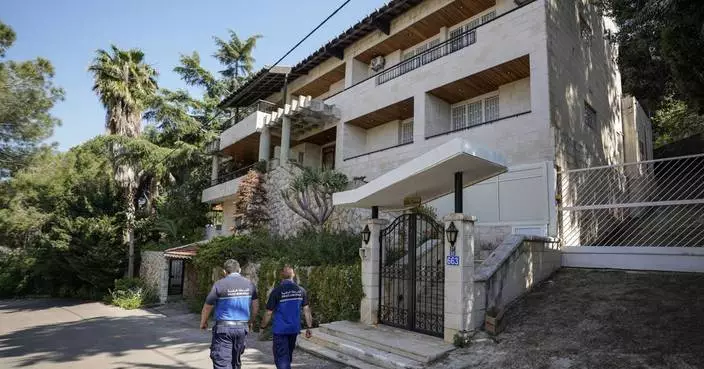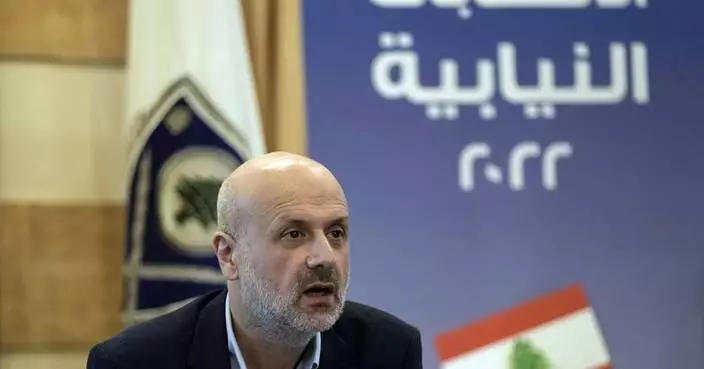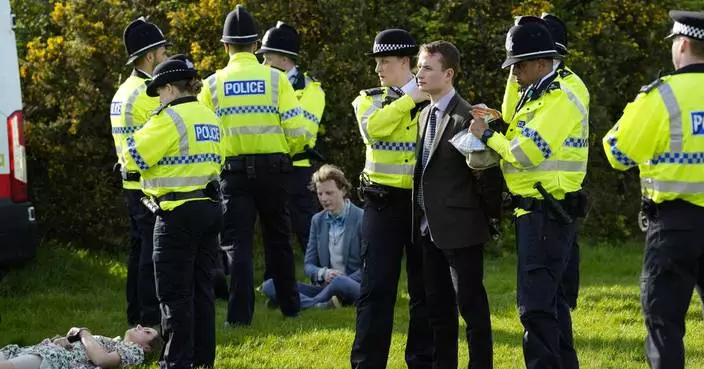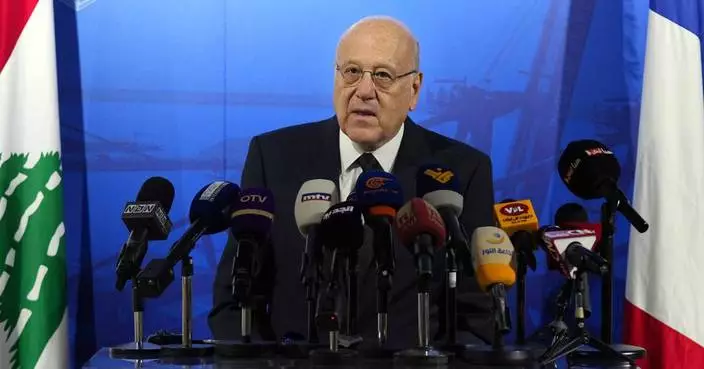Lebanon's currency continued its downward spiral Wednesday, reaching a new low before the dollar and raising such alarm that it prompted a powerful politician to call for a state of “financial emergency.”
The Lebanese pound was reportedly selling at 6,200 to the dollar, losing more than 75% of its value. The pound had been pegged at 1,500 to the dollar since 1997.
Despite government efforts to manage the currency crash — including injecting dollars into the market and setting a higher rate for specific transactions — chaos prevailed and the parallel currency market continued to thrive.
Highly indebted Lebanon is in the throes of financial and economic crises, made worse by restrictions imposed to combat the coronavirus in March. Political rivalries have also complicated negotiations with the International Monetary Fund, which the Lebanese government has asked last month for $10 billion in financial assistance.
On Wednesday, veteran parliament speaker Nabih Berri said the crash of the Lebanese pound is a signal for the government, the central bank and private banks to declare a “financial state of emergency” to review measures to protect the local currency. He didn't elaborate but called the crash “dubious and coordinated.”
“It is unacceptable to leave the Lebanese hostages to the black market for the foreign currency, food, medicine and fuel,” Berri said. “Lebanese politicians would be mistaken if they think that the IMF or any donor country can give us any one penny of assistance if we don't implement reforms.”
Berri said Lebanon has become a “bottomless basket” that no one wants to help.
Dozens of protesters rallied in the southern city of Tyre, chanting against banks. “They are selling their nation for the sake of the dollar,” the protesters chanted, addressing private banks.
Anti-government nationwide protests gripped Lebanon before the coronavirus pandemic restrictions. Lebanese grew impatient with the political class in control since the end of the 15-year civil war in 1990, which they accused of corruption, including some warlords who remained in prominent political roles. The protests died down with the restrictions but the currency crisis sparked new, limited and more violent rallies.
Meanwhile, the Lebanese political class has been bickering over hosting a national dialogue that was called for by the presidency following violent protests that threatened to ignite sectarian violence. Rivals of the government of Prime Minister Hassan Diab said they will boycott the meeting, scheduled Thursday. Diab's government is backed by the powerful Hezbollah group and its allies.
Reflecting the dire straits Lebanon is facing, traditional donors to the state, including Gulf and European countries, have asked for major reforms before dispensing any assistance.
Speaking in Washington on Wednesday, U.S. Secretary of State Mike Pompeo repeated the same line, adding that real reforms are necessary before support is extended to the government. He added that it must be a government that is not “beholden to Hezbollah.”
Hezbollah is on the U.S. sanctions list and Washington considers it one of Iran's most powerful allies in the region.
“When that comes, when the government demonstrates, whoever that is, demonstrates their willingness and capacity to do that I think that not only United States, but the whole world will come in to assist the Lebanese government get its economy back on its feet,” Pompeo said.
BEIRUT (AP) — French Foreign Minister Stéphane Séjourné arrived in Lebanon on Sunday as part of diplomatic attempts to broker a de-escalation in the conflict on the Lebanon-Israel border.
Séjourné met with United Nations peacekeeping forces in south Lebanon and with Lebanon's parliament speaker, army chief, foreign minister and caretaker prime minister.
France “is refusing to accept the worst-case scenario" of a full-scale war in Lebanon, he told journalists after the meetings.
“In southern Lebanon, the war is already here, even if it's not called by that name, and it’s the civilian population who’s paying the price,” he said.
The Lebanese militant group Hezbollah has exchanged near-daily strikes with Israeli forces in the border region — and sometimes beyond — for almost seven months against the backdrop of Israel’s war against Hezbollah ally Hamas in Gaza.
Israeli strikes have killed more than 350 people in Lebanon, most of them fighters with Hezbollah and allied groups but also including more than 50 civilians. Strikes by Hezbollah have killed at least 10 civilians and 12 soldiers in Israel. Tens of thousands are displaced on each side of the border.
A French diplomatic official who spoke on condition of anonymity because they were not authorized to speak to journalists said the purpose of Séjourné’s visit was to convey France’s “fears of a war on Lebanon” and to submit an amendment to a proposal Paris had previously presented to Lebanon for a diplomatic resolution to the border conflict.
Western diplomats have brought forward a series of proposals for a cessation of hostilities between Israel and Hezbollah. Most of those would hinge on Hezbollah moving its forces several kilometers (miles) from the border, a beefed-up Lebanese army presence and negotiations for Israeli forces to withdraw from disputed points along the border where Lebanon says Israel has been occupying small patches of Lebanese territory since it withdrew from the rest of south Lebanon in 2000.
The eventual goal is full implementation of a U.N. resolution that brought to an end a brutal monthlong war between Israel and Hezbollah in 2006.
The previous French proposal would have involved Hezbollah withdrawing its forces 10 kilometers (6 miles) from the border.
Hezbollah has signaled willingness to entertain the proposals but has said there will be no deal in Lebanon before there is a cease-fire in Gaza. Israeli officials, meanwhile, have said that a Gaza cease-fire does not automatically mean it will halt its strikes in Lebanon, even if Hezbollah does so.
Séjourné declined to provide more details about the latest version of France’s proposal ahead of his planned trip to Israel on Tuesday. He said he will have “consultations” with Israeli authorities to move toward an agreement.
The French foreign minister also pushed for the Lebanese political factions to come to an agreement on a candidate to fill a year-and-a-half-long presidential vacuum. Séjourné said that Lebanon needs a president in place in order to be “invited to the negotiating table” and to be able to implement any agreement that might be reached on the border issue.
During the talks, Lebanese officials also raised the issue of the ongoing presence of more than 1 million Syrian refugees in Lebanon, which has become an increasingly contentious issue. Lebanese officials have increasingly called for Western countries to facilitate their return to Syria.
Séjourné acknowledged the burden placed on Lebanon by hosting such a large number of refugees, and said that "all concerned parties must work to make this return possible in a voluntary, dignified and safe manner in accordance with international law."
Associated Press writers Ali Sharaffedine in Beirut and Sylvie Corbett in Paris contributed to this report.

French Foreign Minister Stephane Sejourne speaks during a press conference at the Pine Palace, which is the residence of the French ambassador, in Beirut, Lebanon, Sunday, April 28, 2024. (AP Photo/Hassan Ammar)
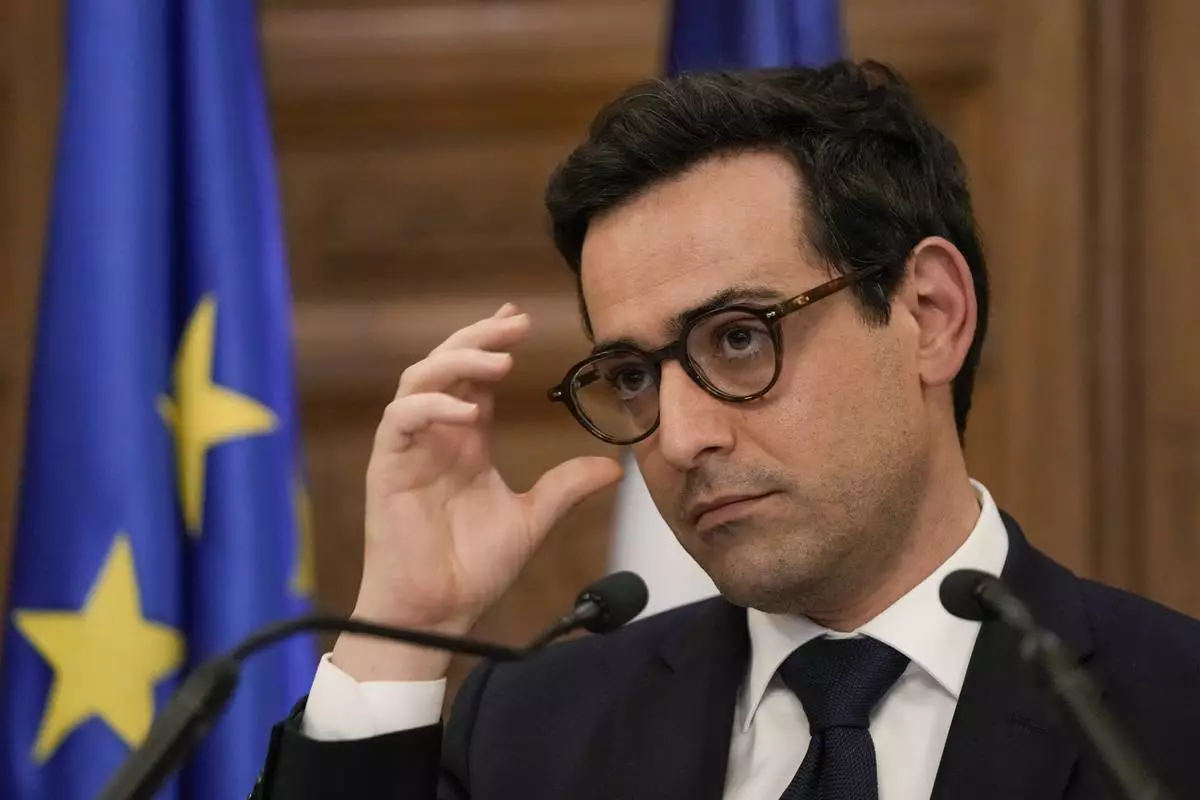
French Foreign Minister Stephane Sejourne adjusts his glasses as he listens to a question during a press conference at the Pine Palace, which is the residence of the French ambassador, in Beirut, Lebanon, Sunday, April 28, 2024. (AP Photo/Hassan Ammar)
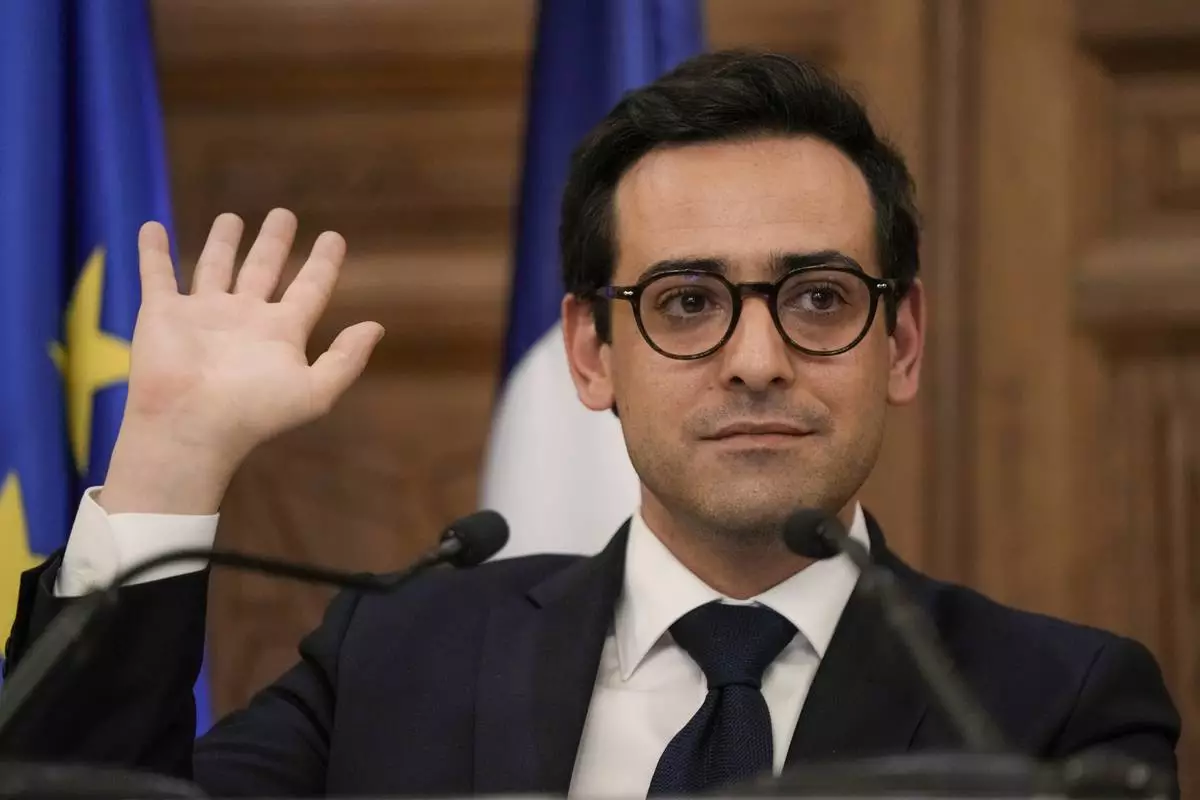
French Foreign Minister Stephane Sejourne gestures as he speaks during a press conference at the Pine Palace, which is the residence of the French ambassador, in Beirut, Lebanon, Sunday, April 28, 2024. (AP Photo/Hassan Ammar)
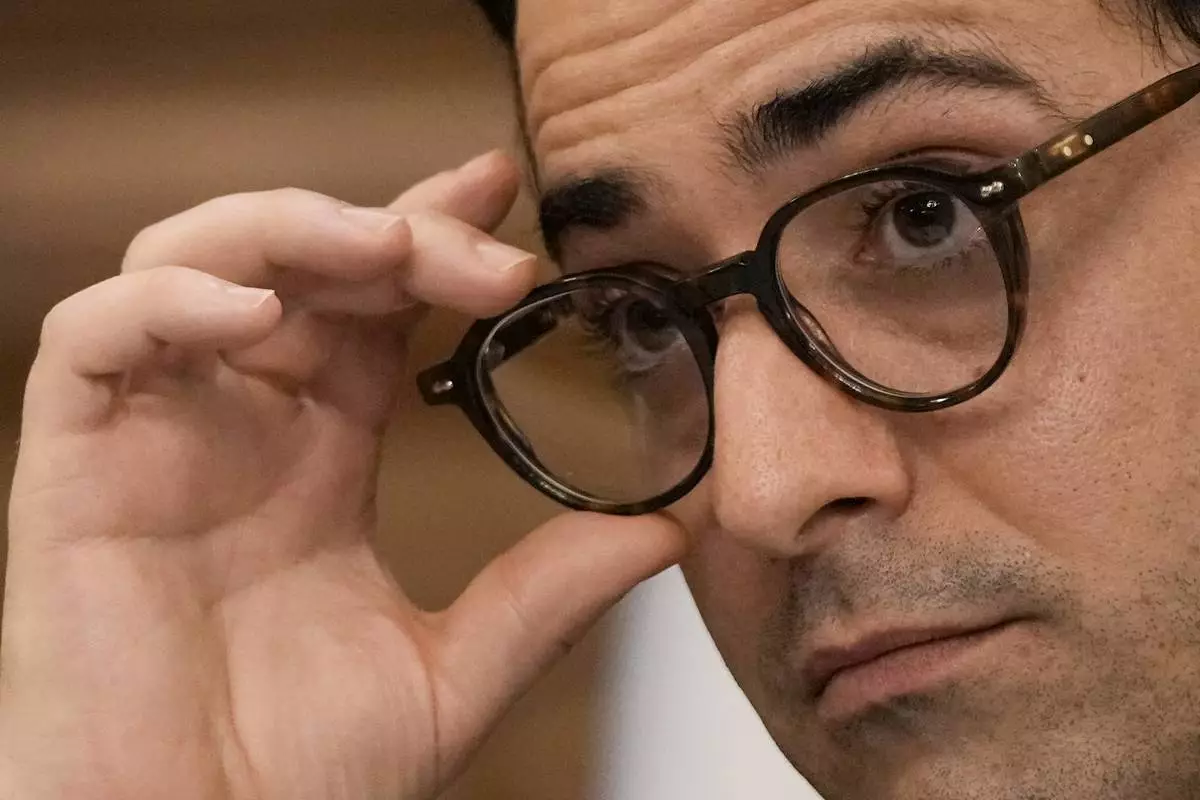
French Foreign Minister Stephane Sejourne adjusts his glasses as he listens to a question during a press conference at the Pine Palace, which is the residence of the French ambassador, in Beirut, Lebanon, Sunday, April 28, 2024. (AP Photo/Hassan Ammar)

French Foreign Minister Stephane Sejourne, gestures as he speaks during a press conference at the Pine Palace, which is the residence of the French ambassador, in Beirut, Lebanon, Sunday, April 28, 2024. (AP Photo/Hassan Ammar)
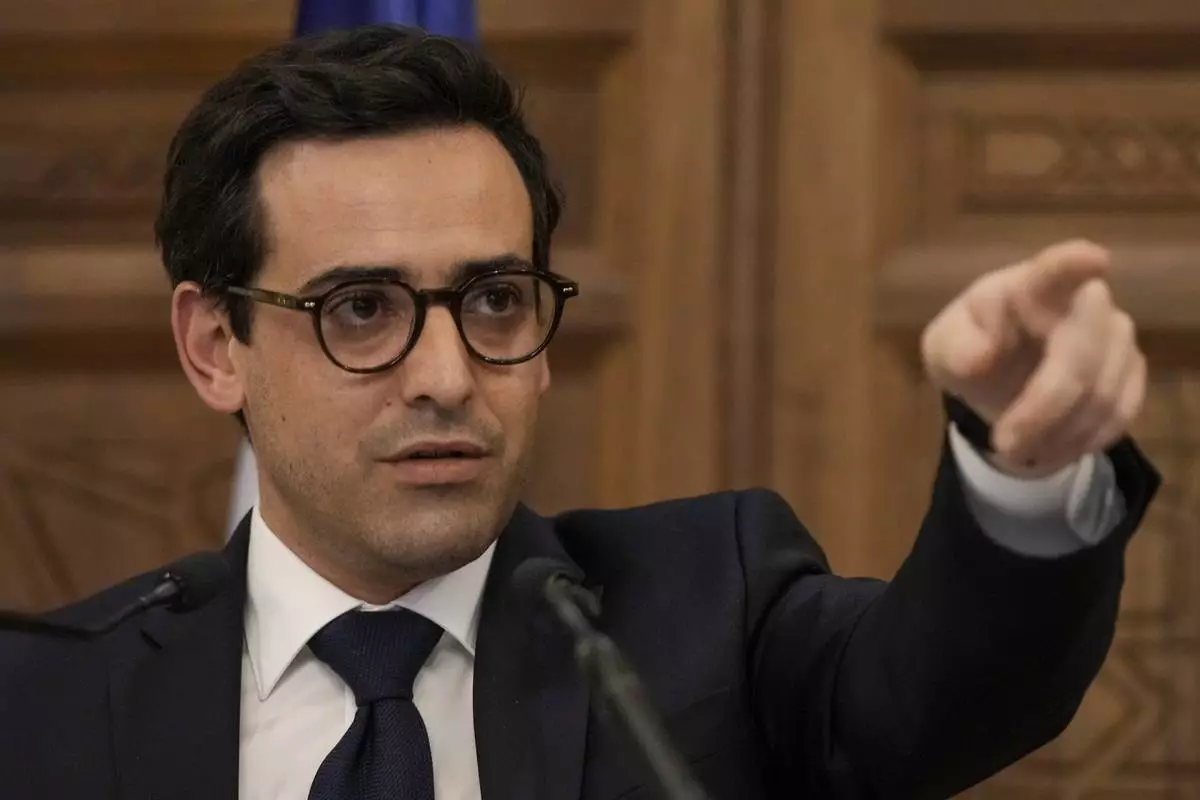
French Foreign Minister Stephane Sejourne gestures as he speaks during a press conference at the Pine Palace, which is the residence of the French ambassador, in Beirut, Lebanon, Sunday, April 28, 2024. (AP Photo/Hassan Ammar)
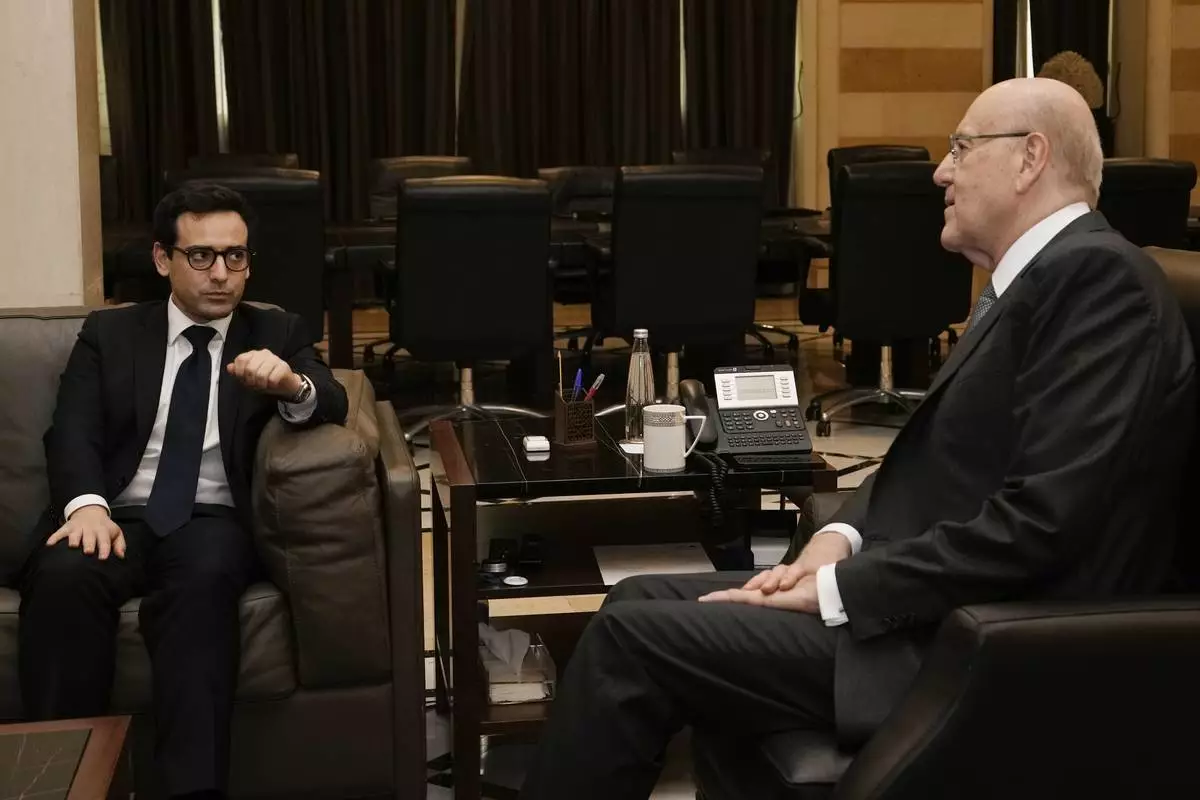
French Foreign Minister Stephane Sejourne, left, meets with Lebanese caretaker Prime Minister Najib Mikati, in Beirut, Lebanon, Sunday, April 28, 2024. (AP Photo/Hassan Ammar)
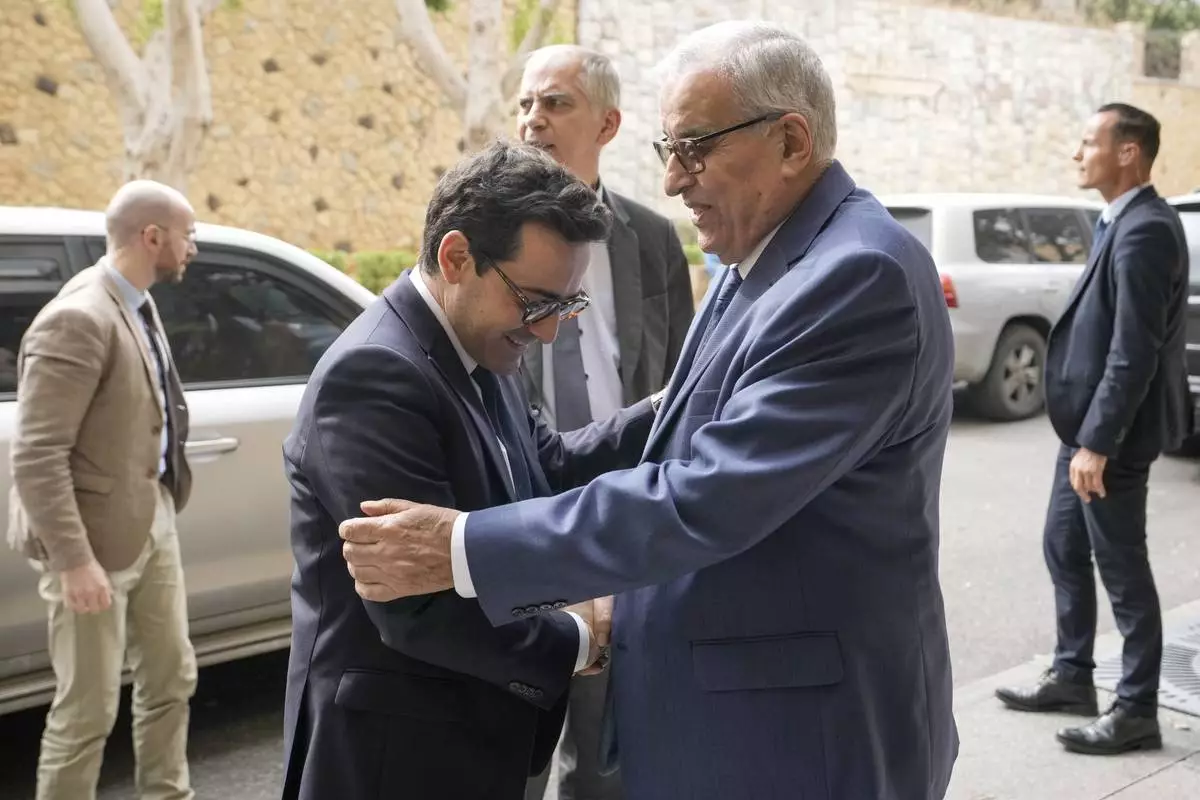
Lebanese Foreign Minister Abdallah Bouhabib, right, welcomes his French counterpart Stephane Sejourne, during their meeting, in Beirut, Lebanon, Sunday, April 28, 2024. (AP Photo/Hassan Ammar)

French Foreign Minister Stephane Sejourne, center, meets with Parliament Speaker Nabih Berri, right, in Beirut, Sunday, April 28, 2024. (AP Photo/Hassan Ammar)
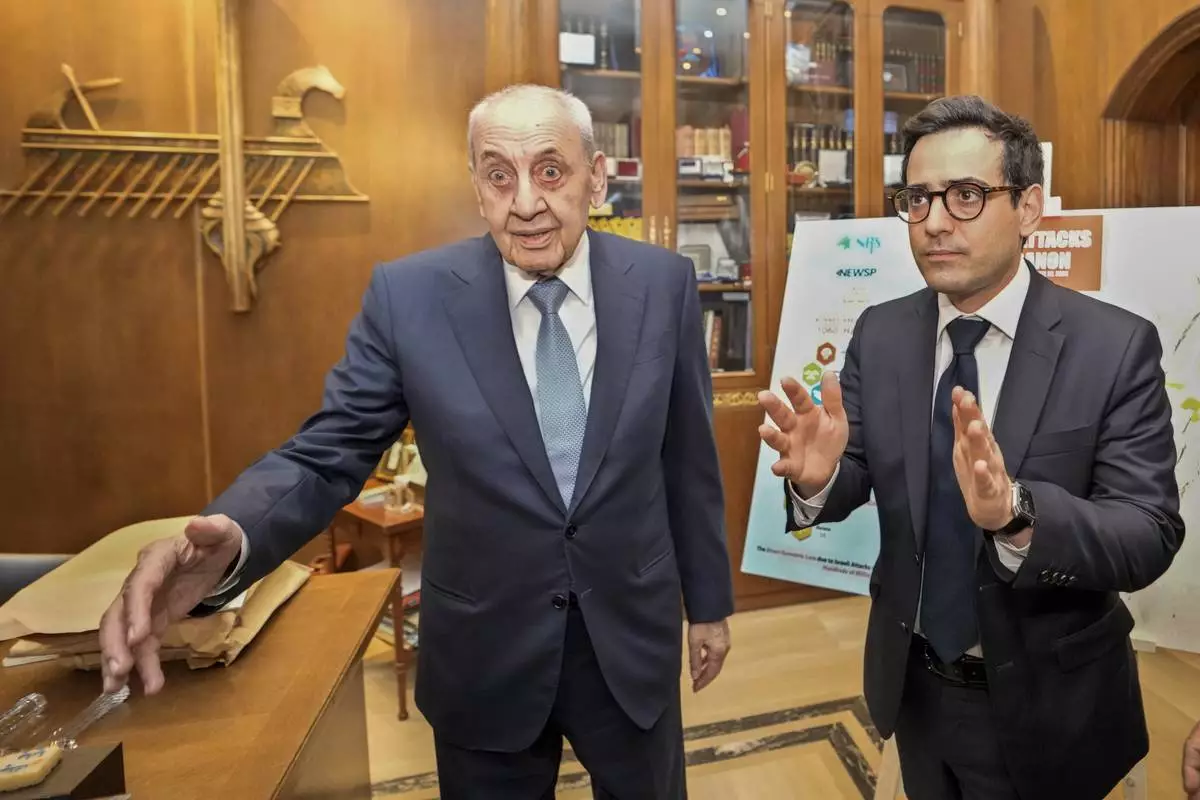
Lebanese Parliament Speaker Nabih Berri, right, gestures after he shows a map that details Israel's strikes on Lebanon since Oct. 7, to visiting French Foreign Minister Stephane Sejourne during their meeting, in Beirut, Lebanon, Sunday, April 28, 2024. (AP Photo/Hassan Ammar)
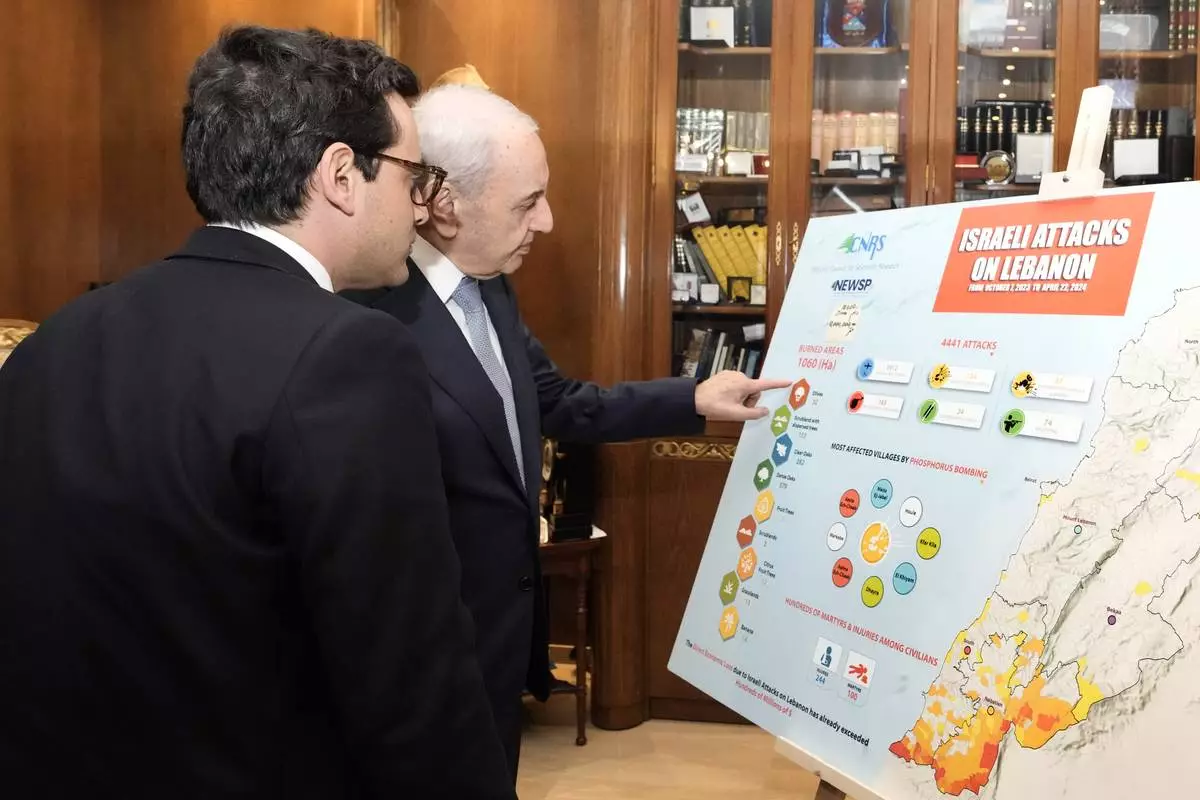
Lebanese Parliament Speaker Nabih Berri, right, shows a map that details Israel's strikes on Lebanon since Oct. 7, to visiting French Foreign Minister Stephane Sejourne during their meeting, in Beirut, Lebanon, Sunday, April 28, 2024. (AP Photo/Hassan Ammar)
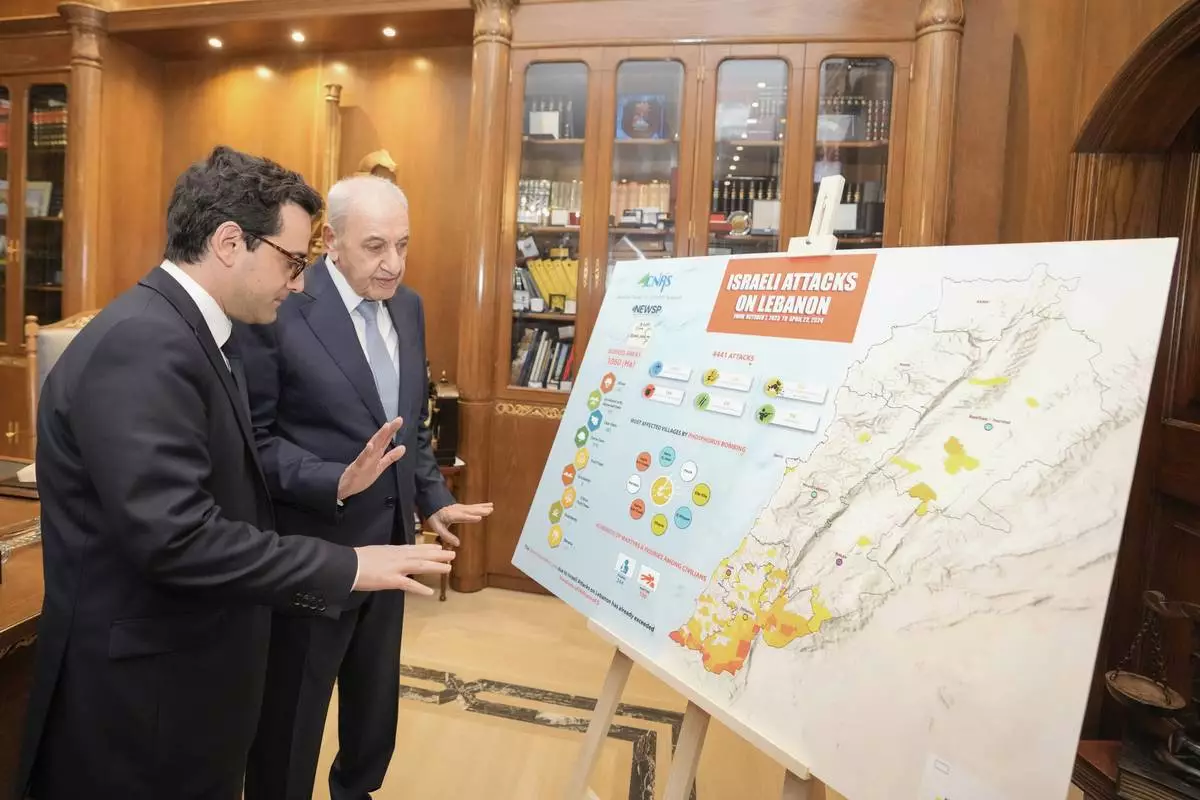
Lebanese Parliament Speaker Nabih Berri, right, shows a map that details Israel's strikes on Lebanon since Oct. 7, to visiting French Foreign Minister Stephane Sejourne during their meeting, in Beirut, Lebanon, Sunday, April 28, 2024. (AP Photo/Hassan Ammar)
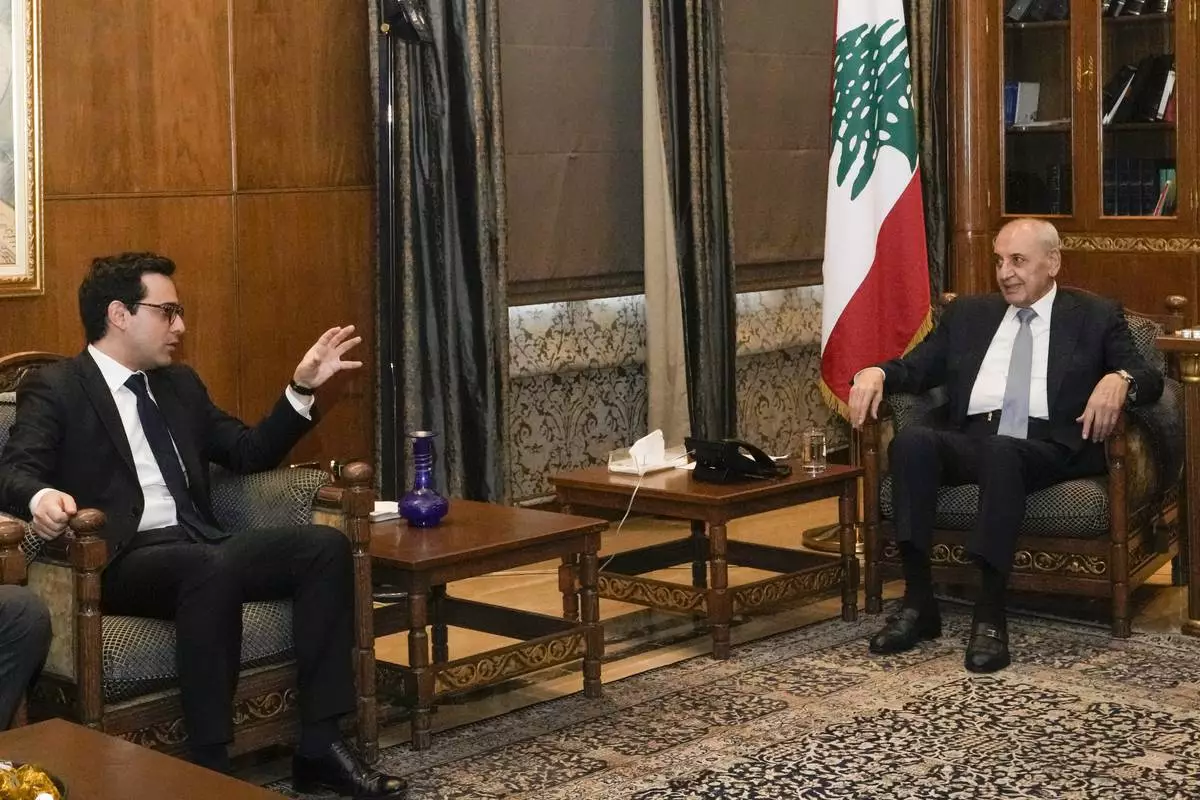
French Foreign Minister Stephane Sejourne, left, speaks with Parliament Speaker Nabih Berri during their meeting in Beirut, Lebanon, Sunday, April 28, 2024. (AP Photo/Hassan Ammar)
















